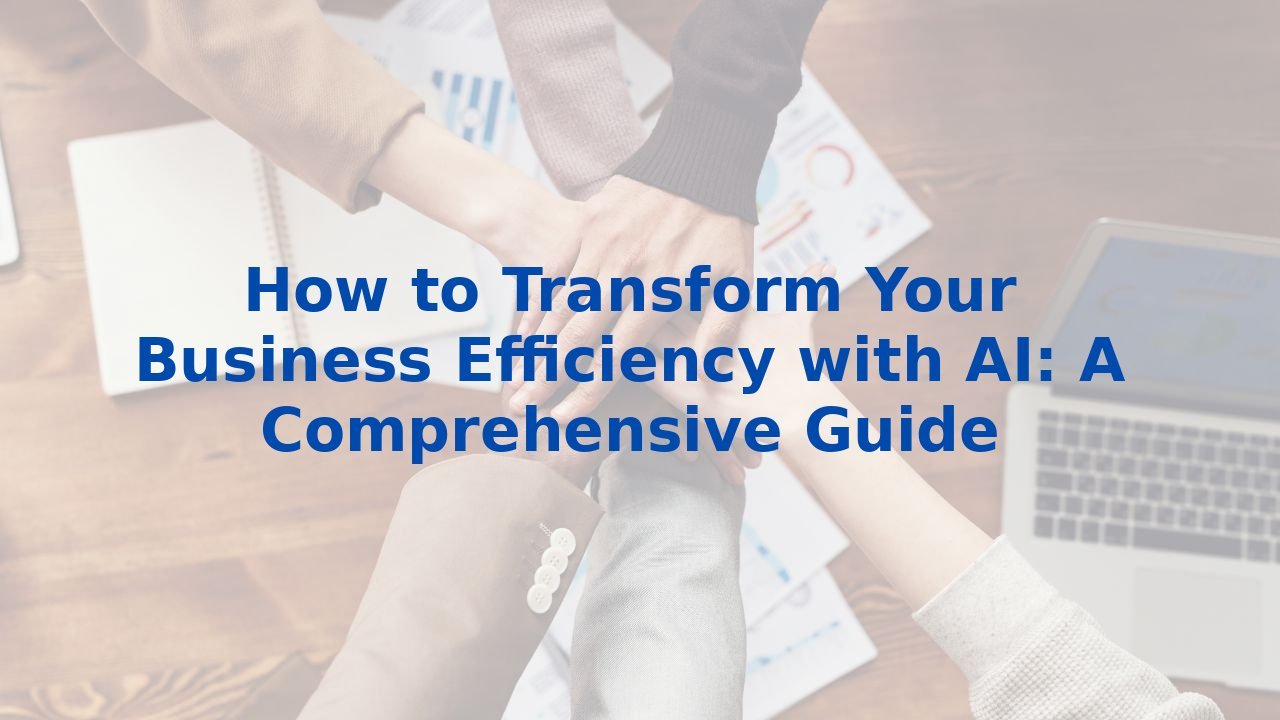How To Transform Your Business Efficiency with AI: A Comprehensive Guide
How To Transform Your Business Efficiency with AI: A Comprehensive Guide
Introduction
In an era characterized by rapid technological advancements and shifting market dynamics, businesses are under constant pressure to optimize operations and enhance productivity. Artificial Intelligence (AI) stands at the forefront of this transformation, offering a suite of benefits that can drive organizations to new heights of efficiency. This guide will explore how AI can refine essential business processes while highlighting the importance of employee training in embracing this revolutionary technology.
1. Better Decision-Making
One of the most profound impacts of AI lies in its ability to elevate decision-making processes. Organizations can leverage AI to analyze vast datasets, uncovering insights that might elude human judgment. By transforming raw data into actionable intelligence, businesses can better understand employee feedback and market trends, leading to more informed strategies and improved overall performance.
2. Efficiency and Productivity Gains
Perhaps the most celebrated advantage of AI is its capacity to enhance efficiency and productivity. By automating mundane and repetitive tasks, AI frees employees to focus on areas that harness their creativity and critical thinking. For instance, in sectors like software development, AI can generate test data, allowing developers to tackle more complex challenges that require a human touch.
3. Improved Speed of Business
In the competitive landscape of today’s marketplace, speed is of the essence. AI dramatically reduces the time required to progress through various stages of business operations. As a result, organizations can adapt swiftly to changes, ensuring they remain responsive to customer demands and market fluctuations. This agility not only leads to faster returns on investments but also strengthens the organization’s competitive advantage.
4. New Capabilities and Business Model Expansion
A significant benefit of integrating AI is the potential for creating new business opportunities. The power of data analytics allows companies to explore untapped revenue streams and rethink traditional business models. For example, sectors such as insurance and automotive can design innovative services by utilizing insights derived from AI, expanding their offerings while enhancing customer satisfaction.
5. Reducing Human Error and Enhancing Quality
The amalgamation of AI with Robotic Process Automation (RPA) serves to drastically minimize human error while boosting adherence to quality standards. Continuous training cycles enable AI systems to refine their processes, leading to superior outcomes. An exemplary case is financial reconciliation, where AI practices can reduce errors to nearly zero, thus optimizing the overall operational value of the organization.
6. Generative AI and Its Impact on Productivity
Generative AI, a subgroup of artificial intelligence, employs advanced algorithms to automate various tasks. By managing repetitive processes, it allows employees to devote more energy toward innovation and growth. The resulting optimization enhances workflow, boosts output, and drives profitability, all crucial elements in a competitive marketplace.
7. AI’s Role in Task Automation and Decision-Making
The versatility of generative AI tools is staggering. They can automate numerous functions, ranging from crafting personalized emails to data entry tasks. This not only saves time but also ensures more thoughtful engagement when communicating with clients and stakeholders. Furthermore, AI enhances predictive capabilities, enabling businesses to foresee trends and make informed decisions confidently.
8. Enhancing Communication and Collaboration
AI tools are advisors in communication and collaboration among teams. Large language models can automate routine correspondence, facilitating seamless exchanges of information and smartly optimizing calendars for efficient scheduling. By enhancing how teams collaborate, AI strengthens the very fabric of organizational culture.
9. Benefits of Employee Training for AI
While the technology itself is remarkable, the true power of AI is unlocked through comprehensive employee training. Familiarizing team members with AI systems can bridge the skill gap, allowing organizations to be nimble and responsive in their operations. Organizations that invest in AI training not only enrich their workforce but also cultivate a culture of continuous learning, enabling employees to utilize AI to its fullest potential.
Conclusion
In summation, embracing AI as part of your business strategy can lead to unprecedented levels of efficiency, productivity, and growth. By automating tasks, enhancing decision-making, and enabling swift adaptations, AI positions organizations to thrive in the digital landscape. Equally crucial is the commitment to empowering employees through AI training, which ensures that businesses harness the complete value of these innovations. As we stride forward into a future shaped by AI, those who prepare their teams and processes stand to gain the most from this transformative technology.
For those looking to accelerate their AI journey, consider exploring Complete AI Training for resources and insights that can guide your organization toward efficiency and growth.



